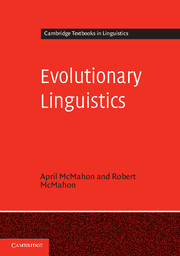Book contents
- Frontmatter
- Contents
- List of Figures
- Preface
- Acknowledgements
- 1 Evolution and history
- 2 Evidence for evolution
- 3 The comparative methods
- 4 Who, where and when?
- 5 The vocal tract
- 6 Language and the brain
- 7 Language and genes
- 8 Big bang or cumulative creep? Saltation versus gradual, adaptive evolution
- 9 From protolanguage to language
- Bibliography
- Index
Preface
Published online by Cambridge University Press: 05 November 2012
- Frontmatter
- Contents
- List of Figures
- Preface
- Acknowledgements
- 1 Evolution and history
- 2 Evidence for evolution
- 3 The comparative methods
- 4 Who, where and when?
- 5 The vocal tract
- 6 Language and the brain
- 7 Language and genes
- 8 Big bang or cumulative creep? Saltation versus gradual, adaptive evolution
- 9 From protolanguage to language
- Bibliography
- Index
Summary
Some necessary background: language and evolution
This book is for anyone who has ever wondered why humans are linguistic animals. There can be no doubt at all that this is exactly what we are: we use language constantly, creatively and almost compulsively. We talk to each other, our pets, and ourselves. We talk to our babies, and are quite unreasonably delighted when they talk back to us (at least for a while). We use language to get to know people; to parade our skills for prospective employers; to share our views; to express our emotions; to negotiate and establish our identities; to argue, lie and mislead; and even, sometimes, to exchange information. We invent new words, which become normal currency within families and social groups; we struggle with which of our various accents to get out of the wardrobe for particular occasions, or which of our languages to use in certain circumstances if we are bilingual; and we get white-hot furious when we feel others are taking liberties with ‘our’ language. One person’s clever neologism is another person’s linguistic mangling.
Language, then, is natural. It is part of our lives from the very start: Mehler et al. (1988), for example, have demonstrated that newborns are capable of differentiating their mother’s language from other languages, even on the basis of a signal filtered so only suprasegmental information remains. Children learn language, as we shall see in Chapter 2, remarkably quickly and efficiently. Language forms part of our identity as individuals, as social groups – and as a species, because one of the remarkable things about language is that no other species seems to do it quite like us. To be sure, other species make noises (some of them quite persistently); and some use vocal or gestural signs, or a combination of both, to communicate. What marks out human language as special is the extraordinary structural complexity all languages display, and the inventiveness with which humans use these systems, applying them regularly to new situations and using new utterances we have neither said nor heard before. Many species use their systems of communication to establish group membership, to issue warnings about dangers in the environment, to keep track of other group members, and to share information; but in general they are restricted in the amount of information they can convey (Hauser 1996).
- Type
- Chapter
- Information
- Evolutionary Linguistics , pp. xiii - xviiiPublisher: Cambridge University PressPrint publication year: 2012
- 1
- Cited by



